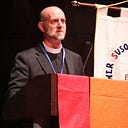As I was reading your comment and then the article, I was reminded of some of the other stuff I have been thinking about a great deal - so much of religion, politics, finance, etc - lends themselves towards concreteness.
My thought on this goes to my theological understanding of the world - the first sin of Scripture, in Genesis 3. We call it the fall of humanity. I'm not concerned with the literalism here - I'm not a literalist theologian.
The early Scripture stories of Genesis offer an attempt to answer the question - why are we here and why are things screwed up? The fall is really about humanity wanting to be in control and knowing. The key idea being that we are trying to be God. We overstep who we are meant to be. We think we are lacking and need more.
And we have this conception of God put in human understanding - that God is just like us, but only with more: more power, more knowledge, more strength, more control. And so we try to get more so we can be more god-like, because we think that if we have more control, life will be better. In the process we miss so much of what life is.
We think that more is better, when in reality it isn't because the idea of more is based on scarcity. I think this then crosses into our politics, our finances, our financial systems, relations with others, and more. Capitalism mixes into this, telling us that what we have is not good enough - we need more. We see the result in how we treat the planet - we are never satisfied.
This never being satisfied goes against the Hebrew idea of Shalom - wholeness and completeness. This is what I think Jesus is talking about when he talks about the kingdom of God.
